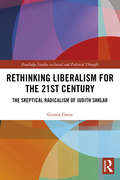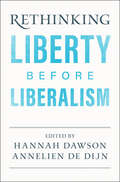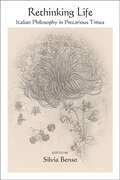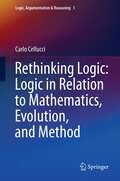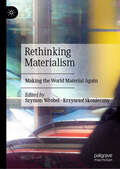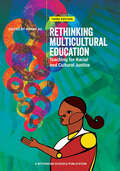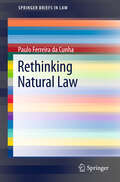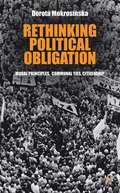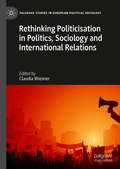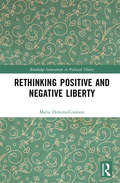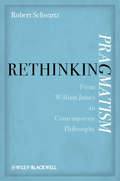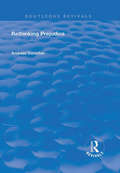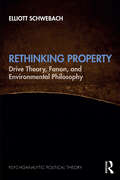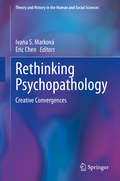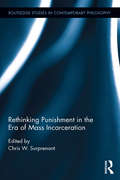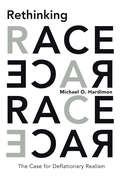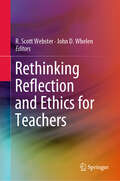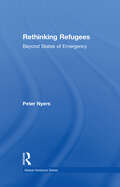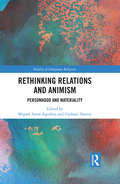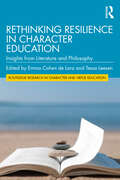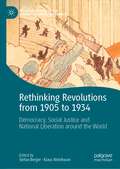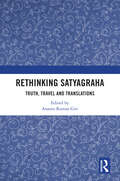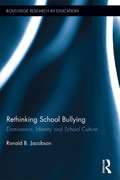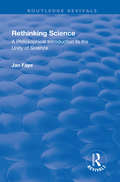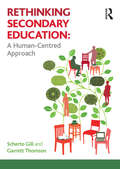- Table View
- List View
Rethinking Liberalism for the 21st Century: The Skeptical Radicalism of Judith Shklar (Routledge Studies in Social and Political Thought)
by Giunia GattaRethinking Liberalism for the 21st Century offers an indispensable reexamination of the life, work, and interventions of a prominent liberal political theorist of the 20th century: Judith Shklar. Drawing on published and unpublished sources including Shklar’s correspondence, lecture notes, and other manuscripts, Giunia Gatta presents a fresh theoretical interpretation of Shklar’s liberalism as philosophically and politically radical. Beginning with a thorough reconstruction of Shklar’s life and her interest in political theory, Gatta turns her attention to examining the tension between Shklar’s critique of the term "modernity" and her passion for Enlightenment thinkers, including Rousseau and Hegel. In the second part of the book, Gatta roots Shklar’s liberalism of permanent minorities in her work in the history of political thought, and highlights this contribution as a fundamental recasting of liberalism as the political philosophy of outsiders. She makes a compelling argument for a liberalism of permanent minorities that refuses to stand on the ground of firm foundations and, instead, is oriented by complex understandings of cruelty and fear. Rethinking Liberalism for the 21st Century is a much-needed reorientation of traditional liberal policies, allowing for a more meaningful intervention in many contemporary debates. As such, it will be of interest to scholars of political theory, the history of political thought and ideas, philosophy, international relations, and political science in general.
Rethinking Liberty before Liberalism
by Hannah Dawson Annelien De DijnOpens up new histories of freedom and republicanism by building on Quentin Skinner's ground-breaking Liberty before Liberalism nearly twenty five years after its initial publication. Leading historians and philosophers reveal the neo-Roman conception of liberty that Skinner unearthed as a normative and historical hermeneutic tool of enormous, ongoing power. The volume thinks with neo-Romanism to offer reinterpretations of individual thinkers, such as Montaigne, Grotius and Locke. It probes the role of neo-Roman liberty within hierarchies and structures beyond that of citizen and state – namely, gender, slavery, and democracy. Finally, it reassesses the relationships between neo-Romanism and other languages in the history of political thought: liberalism, conservatism, socialism, and the human rights tradition. The volume concludes with a major reappraisal by Skinner himself.
Rethinking Life: Italian Philosophy in Precarious Times (SUNY series in Contemporary Italian Philosophy)
by Silvia BensoThis volume gathers fourteen contributions written by Italian philosophers within the context of the precariousness and vulnerability revealed by the Covid-19 pandemic. The pandemic compels us to rethink what is affected most by this global occurrence yet does not end with it—that is, life. Beyond the geographical, socio-political, and medical contexts in which the reflections originate, Rethinking Life is deeply utopian, presenting aspirations toward a different configuration of life and collective living centered on relational subjectivities, interconnectedness, interdependence, and, ultimately, solidarity. How does the pandemic—what it represents and exposes—call us to rethink our notion of life? How does an episode of morbidity affect a fuller understanding of life? Can such a hermeneutic shift be dared and sustained? The sobriety of the reflections yields elegant, incisive, and direct prose of profound effect and immediacy—and a captivating, lucid, and thought-provoking narrative.
Rethinking Logic: Logic in Relation to Mathematics, Evolution, and Method
by Carlo CellucciThis volume examines the limitations of mathematical logic and proposes a new approach to logic intended to overcome them. To this end, the book compares mathematical logic with earlier views of logic, both in the ancient and in the modern age, including those of Plato, Aristotle, Bacon, Descartes, Leibniz, and Kant. From the comparison it is apparent that a basic limitation of mathematical logic is that it narrows down the scope of logic confining it to the study of deduction, without providing tools for discovering anything new. As a result, mathematical logic has had little impact on scientific practice. Therefore, this volume proposes a view of logic according to which logic is intended, first of all, to provide rules of discovery, that is, non-deductive rules for finding hypotheses to solve problems. This is essential if logic is to play any relevant role in mathematics, science and even philosophy. To comply with this view of logic, this volume formulates several rules of discovery, such as induction, analogy, generalization, specialization, metaphor, metonymy, definition, and diagrams. A logic based on such rules is basically a logic of discovery, and involves a new view of the relation of logic to evolution, language, reason, method and knowledge, particularly mathematical knowledge. It also involves a new view of the relation of philosophy to knowledge. This book puts forward such new views, trying to open again many doors that the founding fathers of mathematical logic had closed historically.
Rethinking Materialism: Making the World Material Again
by Szymon Wróbel Krzysztof SkoniecznyTaking as its starting point the diagnosis that events such as the pandemic, the ecological crisis, and the increasingly volatile international situation have made our relationship to the world problematic, the book aims to survey the ways in which this new situation can be productively theorized. Its three parts focus on: discourses of the &“loss&” of the world; attempts at resistance to this loss and regaining the &“common&” world; and discussions of matter as the &“stuff&” of the world.
Rethinking Multicultural Education: Teaching for Racial and Cultural Justice
by Wayne AuFrom book bans, to teacher firings, to racist content standards, the politics of teaching race and culture in schools have shifted dramatically in recent years. This 3rd edition of Rethinking Multicultural Education has been greatly revised and expanded to reflect these changing times, including sections on “Intersectional Identities,” “Anti-Racist Teaching Across the Curriculum,” “Teaching for Black Lives,” and “K-12 Ethnic Studies,” among others. Practical, rich in story, and analytically sharp, Rethinking Multicultural Education can help current and future educators as they seek to bring racial and cultural justice into their own classrooms.
Rethinking Natural Law
by Paulo Ferreira da CunhaFor centuries, natural law was the main philosophical legal paradigm. Now, it is a wonder when a court of law invokes it. Arthur Kaufmann already underlined a modern general "horror iuris naturalis". We also know, with Winfried Hassemer, that the succession of legal paradigms is a matter of fashion. But why did natural law become outdated? Are there any remnants of it still alive today? This book analyses a number of prejudices and myths that have created a general misconception of natural law. As Jean-Marc Trigeaud put it: there is a natural law that positivists invented. Not the real one(s). It seeks to understand not only the usual adversaries of natural law (like legalists, positivists and historicists) but also its further enemies, the inner enemies of natural law, such as internal aporias, political and ideological manipulations, etc. The book puts forward a reasoned and balanced examination of this treasure of western political and juridical though. And, if we look at it another way, natural law is by no means a loser in our times: because it lives in modern human rights.
Rethinking Political Obligation
by Dorota MokrosinskaWhat are the grounds for and limits to obedience to the state? This book offers a fresh analysis of the debate concerning the moral obligation to obey the state, develops a novel account of political obligation and provides the first detailed argument of how a theory of political obligation can apply to subjects of an unjust state.
Rethinking Politicisation in Politics, Sociology and International Relations (Palgrave Studies in European Political Sociology)
by Claudia WiesnerThis book decisively advances the academic debate on politicisation beyond the state of the art. It is the first book to theorise and conceptualise ‘politicisation’ across the epistemic communities of different subdisciplines, bringing together the different strands in the debate: (international) political theory, political sociology, comparative politics, EU studies, legal theory and international relations. This provides a comprehensive discussion of different concepts of politicisation, their ontological and theoretical backgrounds, and their analytical value, including speech-act, practice- and actor-oriented approaches. Furthermore, the linkages of politicisation to the concepts of politics and the political, democracy, depoliticisation, juridification, populism, and Euroscepticism are clarified. Finally, the book shows how the methodological toolbox in empirical politicisation research can be completed regarding different arenas, actors and modes of politicisation. The volume thus provides a much-needed theoretical and conceptual reflection to the newly emerging research field of politicisation in order to recognise and define the key issues and build a solid foundation for further debate and empirical research. ‘When does something come to be considered political - for good or for ill? In social scientific terms, what is politicisation, under what conditions does it occur, created by whom, and with what consequences. These questions drive this outstanding collection of papers that explore how politicization is to be theorized and methodologies for its study. Rather than just a special sphere of activity, the volume demonstrates how politics is best thought of as an activity that can occur across individual and various collective levels. One of the signature contributions of this volume is its exploration of these issues across disciplines: political science, philosophy, sociology and international relations. The texts will be of interest to all students of politics at a time when the very basis of political identity, action, and organization is contested, normatively and analytically. The texts will help bring clarity to these debates.’ —David L. Swartz, Department of Sociology, Boston University, USA ‘Politization has become a widely used and disputed term In International Relations (IR) and more recently in comparative politics as well. This edited volume tries to elevate the term politization onto an analytical concept by i.a. opening it up for action theoretical and organizational approaches. One of the great achievements of the editor is to bring conceptual order into a dispersed debate across political science and its subdisciplines. Moreover, the contributions show how to apply the concept(s) of politization on such different subjects such as democratization, de-democratization, transitions, denationalization or the emergence of populism and Euroscepticism. This is a muchawaited book which can become a conceptual point of reference for better understanding the evolution of national and international regimes.’ —Wolfgang Merkel, Humboldt University of Berlin, Germany
Rethinking Positive and Negative Liberty (Routledge Innovations in Political Theory)
by Maria Dimova-CooksonThis book argues that the distinction between positive and negative freedom remains highly pertinent today, despite having fallen out of fashion in the late twentieth century. It proposes a new reading of this distinction for the twenty-first century, building on the work of Constant, Green and Berlin who led the historical development of these ideas. The author defends the idea that freedom is a dynamic interaction between two inseparable, yet sometimes fundamentally, opposed positive and negative concepts – the yin and yang of freedom. Positive freedom is achieved when one succeeds in doing what is right, while negative freedom is achieved when one is able to advance one’s wellbeing. In an environment of culture wars, resurging populism and challenge to progressive liberal values, recognising the duality of freedom can help us better understand the political dilemmas we face and point the way forward. The book analyses the duality of freedom in more philosophical depth than previous studies and places it within the context of both historical and contemporary political thinking. It will be of interest to students and scholars of liberalism and political theory.
Rethinking Pragmatism
by Robert SchwartzRethinking Pragmatism explores the work of the American Pragmatists, particularly James and Dewey, challenging entrenched views of their positions on truth, meaning, instrumentalism, realism, pluralism and religious beliefs. It clarifies pragmatic ideas and arguments spelling out the significant implications they have for present-day philosophical controversies. Explores the work of the American Pragmatists, especially James and Dewey, on the issues of truth, reference, meaning, instrumentalism, essences, realism, pluralism and religious beliefs. The only available publication to provide a detailed commentary on James's book, Pragmatism, while exploring the implications of the American Pragmatists' ideas and arguments for contemporary philosophical issuesChallenges standard readings of the American Pragmatists' positions in a way that illuminates and questions the assumptions underlying current discussions of these topics.Coherently arranged by structuring the book around the themes discussed in each chapter of James's original work.Provides a new analysis and understanding of the pragmatic theory of truth and semantics.
Rethinking Prejudice (Routledge Revivals)
by Andreas DorschelThis title was first published in 2000. Rethinking Prejudice offers the first philosophical monograph on the concept of prejudice. It takes its start from a study of Enlightenment thought, and pursues the topic to the reassessment of prejudice in contemporary hermeneutics. Yet history of ideas is a means rather than an end in this book. Dorschel analyzes the debates about prejudice from the 17th century onwards in order to shed light upon present concerns. Prejudice is not something peculiar to racists and similarly sinister figures, Dorschel argues; rather, it is an indispensable part of everyone's intellectual repertoire; if relevant phenomena are to be criticized, a genuine moral stance cannot be avoided. This book introduces and explores a topic of wide interest, particularly to those researching within the fields of philosophy, history of ideas, cultural studies, and social and political theory.
Rethinking Property: Drive Theory, Fanon, and Environmental Philosophy (Psychoanalytic Political Theory)
by Elliott SchwebachIn this eye-opening study at the intersection of psychoanalytic theory and political organization and thought, Elliott Schwebach explores why property can be understood to be oppressive and how political theory overlooks its unique significance as a pillar of social violence.Synthesizing insights from Pierre-Joseph Proudhon, Sigmund Freud, Ives Hendrick, and Frantz Fanon, Schwebach investigates human activity as shaped by the effects of property regimes and traces broader implications for understanding the legacies of colonial domination. He then shifts focus to contemporary eco-theory, challenging the Lockeanism that continues to characterize premodern Indigenous environmental engagements and presenting novel frameworks for understanding healthy ecopolitical activity based upon the trajectories of psychological drives.This unique perspective validates creative expressions of decolonial resistance and offers fruitful alternatives to customary positions in psychoanalytic and environmental political philosophy. The book will be an indispensable resource for scholars of property, Freudian psychology, political ecology, and the visionary thought of Frantz Fanon.
Rethinking Psychopathology: Creative Convergences (Theory and History in the Human and Social Sciences)
by Ivana S. Marková Eric ChenThis book presents an original approach to the study of psychiatry that is based on a justified epistemological position, which demands that both the natural and the human/social sciences are necessary in developing our understanding. Psychiatry as a medical specialism was constructed in the nineteenth century through the interplay of both the natural sciences and the human/social sciences. This interplay has created a hybrid discipline that spans biological and socio-cultural-historical domains, which has raised challenges for its understanding and research. This book focuses on one of the principal challenges – how can we explore mental symptoms and mental disorders as complexes of neurobiology on the one hand and meaning on the other?The chapters in this book, dedicated to Germán E Berrios, founder of the Cambridge school of psychopathology, tackles distinctive aspects of psychopathology or related areas. By means of a combination of approaches, chapters seek to unfold another element in our understanding of this field as well as raise new directions for its further study. Rethinking Psychopathology is a valuable resource for clinical psychologists and psychotherapists, psychological researchers, historians of psychology, cultural psychologists, critical psychologists, social scientists, philosophers of psychology, and philosophers of science.
Rethinking Punishment in the Era of Mass Incarceration (Routledge Studies in Contemporary Philosophy)
by Chris W. SurprenantOne of the most important problems faced by the United States is addressing its broken criminal justice system. This collection of essays offers a thorough examination of incarceration as a form of punishment. In addition to focusing on the philosophical aspects related to punishment, the volume’s diverse group of contributors provides additional background in criminology, economics, law, and sociology to help contextualize the philosophical issues. The first group of essays addresses whether or not our current institutions connected with punishment and incarceration are justified in a liberal society. The next set of chapters explores the negative effects of incarceration as a form of punishment, including its impact on children and families. The volume then describes how we arrived at our current situation in the United States, focusing on questions related to how we view prisons and prisoners, policing for profit, and the motivations of prosecutors in trying to secure convictions. Finally, Rethinking Punishment in the Era of Mass Incarceration examines specific policy alternatives that might offer solutions to our current approach to punishment and incarceration.
Rethinking Race: The Case For Deflationary Realism
by Michael O. HardimonBecause science has shown that racial essentialism is false, and because the idea of race has proved virulent, many people believe we should eliminate the word and concept entirely. Michael Hardimon criticizes this thinking, arguing that we must recognize the real ways in which race exists in order to revise our understanding of its significance.
Rethinking Reflection and Ethics for Teachers
by R. Scott Webster John D. WhelenThis book reexamines reflection and ethics for teachers, and argues the case for ensuring teaching practices are educational and professional rather than simply technical or clinical. Demonstrating that theory is indispensable when it comes to professional deliberation and educational practice, the authors draw on their experience to provide insights for teachers that will enable them to become better professional educators. This collection of research chapters, written by established researchers and educators in the field who are familiar with a variety of teaching contexts and are conversant with the current teaching standards and policies relating to teaching and teacher education, is a valuable resource for practicing teachers, researchers, policy-makers as well as for final-year student-teachers in Initial Teacher Education programs. Further, it enables early career teachers to meet their professional responsibilities in a more critically informed and capable manner.
Rethinking Refugees: Beyond State of Emergency
by Peter NyersFirst Published in 2006. Routledge is an imprint of Taylor & Francis, an informa company.
Rethinking Relations and Animism: Personhood and Materiality (Vitality of Indigenous Religions)
by Graham Harvey Miguel Astor-AguileraPersonhood and relationality have re-animated debate in and between many disciplines. We are in the midst of a simultaneous "ontological turn", a "(re)turn to things" and a "relational turn", and also debating a "new animism". It is increasingly recognised that the boundaries between the "natural" and "social" sciences are of heuristic value but might not adequately describe reality of a multi-species world. Following rich and provocative dialogues between ethnologists and Indigenous experts, relations between the received knowledge of Western Modernity and that of people who dwell and move within different ontologies have shifted. Reflection on human relations with the larger-than-human world can no longer rely on the outdated assumption that "nature" and "cultures" already accurately describe the lineaments of reality. The chapters in this volume advance debates about relations between humans and things, between scholars and others, and between Modern and Indigenous ontologies. They consider how terms in diverse communities might hinder or help express, evidence and explore improved ways of knowing and being in the world. Contributors to this volume bring different perspectives and approaches to bear on questions about animism, personhood, materiality, and relationality. They include anthropologists, archaeologists, ethnographers, and scholars of religion.
Rethinking Resilience in Character Education: Insights from Literature and Philosophy (Routledge Research in Character and Virtue Education)
by Emma Cohen de Lara Tessa LeesenThis timely volume offers a nuanced reassessment and understanding of resilience through the lens of virtue ethics and character education, presenting practical strategies for the use of narratives to implement a virtue-ethical approach to resilience in classrooms.Highlighting the rich conceptual history that can be traced in a range of literary and philosophical texts, a diverse range of authors analyse what Plato, Socrates, Cicero, Augustine, Pizan, Montaigne, Weber, and Van der Heijden can teach students and teachers alike about resilience, self-reflection, and growth. The chapters provide a variety of pedagogical suggestions, discussion points, and reflection activities on how to use these texts in the classroom to encourage virtue literacy, engagement with virtuous role models, and an awareness of cultural influences on our understanding of resilience. The book provides a space for educational practitioners and students to engage with literary and philosophical texts that provide nuanced exemplars and insights into resilience, thereby encouraging students to construct their personal journey toward coping with adversity.Novel in approach and rich in insights, this book will be of use to researchers, educators, and scholar practitioners in the philosophy of education, moral and values education, and citizenship education. Those interested in how literature can shape character and moral agency may also benefit from the volume more broadly.
Rethinking Revolutions from 1905 to 1934: Democracy, Social Justice and National Liberation around the World (Palgrave Studies in the History of Social Movements)
by Stefan Berger Klaus WeinhauerThis edited collection offers a timely and original perspective on the many upheavals and revolutions that broke out across the world during the earlytwentieth century. With previous research tending to confine revolutions within national borders, this book sets out to place them within a broader global sphere of thought and action. The authors explore the time phase between the Russian Revolution of 1905 and the Asturian Revolution of 1934, including cases from South Africa, Australia, China, the Middle East and Latin America. Providing insights from leading scholars in the field, this collection highlights the interconnectedness and transnationalism of upheavals and revolutions, offering a new approach which integrates political, social and cultural history.Chapter 8 is available open access under a Creative Commons Attribution 4.0 International License via Link.springer.com
Rethinking Satyagraha: Truth, Travel and Translation
by Ananta Kumar GiriRethinking Satyagraha: Truth, Travel and Translations explores the multi-dimensional aspects of Satyagraha as a movement of being with and striving for and fighting for Truth and Truth realizations. The book goes beyond the conventional discourse of Satyagraha as a social and political action that Gandhi undertook, and links this to the wider moral, philosophical and spiritual quest that are implicated in Satyagraha with and beyond Gandhi. It links Satyagraha to our efforts to overcome the dualism between self and other in various ways. It also relates work and meditation with Truth in Satyagraha to translation and travel. It cultivates a new hermeneutics, politics and spirituality of Satyagraha which is simultaneously everyday and epochal. The book further invites us to rethink and transform the post-Truth discourse and live with Truth and truths—relative, relational and Absolute—with care, courage, creativity and transcendence.With contribution from leading scholars from across the world, Rethinking Satyagraha is a pioneering effort in reiterating the epochal significance of Satyagraha for the 21st century. It makes an important contribution to contemporary Gandhian scholarship and new horizons of social and political theory. It will be of interest to scholars and researchers of movement and resistance studies, Gandhi, Indian philosophy, cultural studies, literary studies, religious studies, development studies, sociology, anthropology, political science and future studies.
Rethinking School Bullying: Dominance, Identity and School Culture (Routledge Research in Education #90)
by Ronald B. JacobsonThis book takes a new angle on a much-studied phenomenon, focusing on the role of domination and identity construction, understanding and self-knowledge, moral transformation and the social community, systems of training and hierarchy used by schooling, and the role they play in bullying. Exploring typical narratives of value within schooling (i.e., who counts and who doesn’t?), the volume shows how bullying might make sense to a student as a pathway of identity construction within such stories (discourses and practices taken up by schools). It suggests how we can "tell a new story" and create a new culture which might undermine, or close off, the allure of bullying as a "need-meeting" avenue for students within schools.
Rethinking Science: A Philosophical Introduction to the Unity of Science (Ashgate New Critical Thinking In Philosophy Ser.)
by Jan FayeThis title was first published in 2002.Science and humanity are usually seen as very different: the sciences of nature aim at explanations whereas the sciences of man seek meaning and understanding. This book shows how these contrasting descriptions fail to fit into a modern philosophical account of the sciences and the arts. Presenting some of the major ideas within the philosophy of science on facts, explanation, interpretation, methods, laws, and theories, Jan Faye compares various approaches, including his own. Arguing that the sciences of nature and the sciences of man share a common practice of acquiring knowledge, this book offers a unique introduction to key aspects in the philosophy of science.
Rethinking Secondary Education: A Human-Centred Approach
by Garrett Thomson Scherto Gill'This is a timely, accessible and engaging book of considerable intellectual stature, bold imagination and practical wisdom. Not only does it develop penetrating, elegant analyses of what is wrong with current state controlled and alternative approaches to contemporary education, it also offers imaginative, practical suggestions for a more fulfilling, human centred alternative.' Professor Michael Fielding, Institute of Education, University of London, UK. 'With great sensitivity and force, and in wonderfully clear prose, Scherto Gill and Garrett Thomson explore some fundamental questions about what we want from our education system and what we can expect from it. [...] It is highly recommended for all who are interested in education, whether from a more theoretical point of view or from a more practical point of view' Professor Adrian W. Moore, Faculty of Philosophy, University of Oxford, UK. Could we have a system of secondary education that provides alternatives to the current mainstream schooling and its emphasis on exams, learning outcomes and the delivery of a fixed curriculum? How could such a system focus on both human and educational values? How could secondary education combine the personal development of students with good academic standards? In response to these questions, Gill and Thomson have written a new, cutting-edge text aimed at all those involved in the study of education or teacher training. Rethinking Secondary Education explores, debates and critiques new and alternative approaches to teaching young people today. The book discusses a 'human-centred' approach to curriculum, pedagogy, assessment and the culture of schools and colleges. It is grounded in theory and empirical research, discussing the need for a curriculum for the future, bridging a gap between mainstream and alternative education. It also offers practical guidance on how these ideas can be put into practice, making it an ideal resource for trainee teachers, experienced practitioners and students of education alike. Key features of the text: A balanced approach, comparing and contrasting both traditional and alternative approaches to education Strong grounding in theory and research The inclusion of young people's perspectives and 'voices' on their education and on being an adolescent Links to practice - showing how the theory and research can actually be put into practice to bring about change
